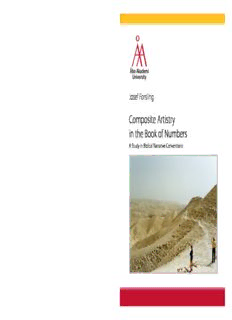Table Of ContentJosef Forsling
Composite Artistry in
the Book of Numbers
J
o
s
e
f
A Study in Biblical Narrative Conventions Fo Josef Forsling
r
s
Is the book of Numbers an unreadable text? What lin
readers of the book encounter is a huge amount of g
immensely variegated materials. These are se | C Composite Artistry
o
emingly mixed without an overar ching plan, which m
p
has rendered the judgment that Numbers may o in the Book of Numbers
s
be apprehended as the ’junk room of the priestly it
e
code.’ A A Study in Biblical Narrative Conventions
r
t
The present thesis takes a firm grasp of the nar is
t
r
rative features of the book, and ask how these con y
tribute to, and disrupt, the coherence of the work. in
t
The aim is to describe the features and to evaluate h
e
their effects, which constitutes a unique contribu B
o
tion to the discussion on Numbers. o
k
in
t
h
e
B
o
o
k
o
f
N
u
m
b
e
r
s
| 2
0
1
3
9 789517 657068
Åbo Akademi University Press | ISBN 978-951-765-706-8
Josef Forsling (born1978)
M.Th., 2006, International Baptist Theological Seminary, Prague;
B.Th., 2002, Stockholm School of Theology
Åbo Akademi University Press
Tavastgatan 13, FI20500 Åbo, Finland
Tel. +358 (0)2 215 3478
Email: [email protected]
Sales and distribution:
Åbo Akademi University Library
Domkyrkogatan 2–4, FI20500 Åbo, Finland
Tel. +358 (0)2 215 4190
Email: [email protected]
COMPOSITE ARTISTRY IN THE BOOK OF NUMBERS
Composite Artistry in
the Book of Numbers
A Study in Biblical Narrative Conventions
Josef Forsling
Studia Theologica Holmiensia 22
Åbo Akademis förlag | Åbo Akademi University Press
Åbo, Finland, 2013
CIP Cataloguing in Publication
Forsling, Josef.
Composite artistry in the Book of
Numbers : a study in biblical narrative
conventions / Josef Forsling. - Åbo :
Akademi University Press, 2013. - (Studia
Theologica Holmiensia, ISSN 1401-1557 ;
22).
Diss.: Åbo Akademi University. - Summary.
ISBN 978-951-765-706-8
ISBN 978-951-765-706-8
ISBN 978-951-765-707-5 (digital)
Painosalama Oy
Åbo 2013
Abstract
ThepresentthesisdiscussesthecoherenceorlackofcoherenceinthebookofNumbers,with
special regard to its narrative features. The fragmented nature of Numbers is a well-known
probleminresearchonthebook,affectinghowweapproachandinterpretit,buttodatethere
hasnotbeenanythoroughinvestigationofthenarrativefeaturesoftheworkandhowthey
mightcontributetothecoherenceorthelackofcoherenceinthebook.Thediscussionispur-
suedinlightofnarrativetheory,andespeciallyinconnectiontothreeparametersthataretyp-
icallyunderstoodtobeinvokedintheinterpretationofnarratives:1)anarrativeparadigm,or
‘story,’meaningeventsrelatedtoeachothertemporally,causally,andthematically,inaplot
withabeginning,middle,andend;2)discourse,beingtheexpressionplaneofanarrative,or
thedevicesthatanauthorhasathandinconstructinganarrative;3)thesituationorlanguage-
game of the narrative, prototypical examples being factual reports, which seeks to depict a
stateofaffairs,andstorytellingnarratives,drivenbyademandfortellability.Inviewofthese
parametersthepresentthesisarguesthatitisreasonabletoformfourgroupstodescribethe
narrative material of Numbers: genuine narratives (e.g. Num 12), independent narrative se-
quences(e.g.Num5:1-4),instrumentalscenesandsituations(e.g.Num27:1-5),andnarrative
fragments(e.g.Num18:1).Thesegroupsaremixedthroughoutwithnon-narrativematerials.
Seentogether,however,thenarrativefeaturesofthesegroupscanbeunderstoodtocreatean
attenuated narrative sequence from beginning to end in Numbers, where one thing happens
afteranother.Thissequence,termedthe‘largerstory’ofNumbers,concernsthewanderingof
IsraelfromSinaitoMoab.Furthermore,thelargerstoryhasafragmentedplot.Theend-point
isfixedonthepromisedland,Israelpreparesforthewanderingtowardsit(Num1-10),rebels
againstwanderingandthepromiseandissentbackintothewilderness(Num13-14),returns
againafterfortyyears(Num21ff.),andpreparesforconqueringtheland(Num22-36).Final-
ly,themesofthepromisedland,generationalsuccession,andobedience-disobedience,oper-
ateinthislargerstory.Purityisalsoasignificantthemeinthebook,albeitnotconnectedto
plotinthelargerstory.Allinall,sequence,plot,andthemeinthelargerstoryofNumbers
canbeunderstoodtobringsomecoherencetothebook.However,neitheraspectentirelysub-
sumesthewholebook,andthefourgroupsofnarrativematerialscanalsobeunderstoodto
underscore the incoherence of the work in differentiating its variegated narrative contents.
Numbersshouldthereforebedescribedasananthologyofdifferentmaterialsthatareloosely
connectedthroughitsnarrativefeaturesinthelargerstory,withtheaimofinformingIsraelite
identity by depicting a certain period in the early history of the people.
Keywords:bookofNumbers,poetics,narrativetheory,narratology,coherence,incoherence,
narrativity, story, discourse, language-game, plot, theme, larger story, anthology.
- 1 -
Preface
Approachingtheendofaratherlongishbutinterestingsectionofmylife’sjour-
ney, in which I partly have had the privilege to determine where to go, I would
liketotaketheopportunitytothanksomeofmyfellowpassengersfortheirsup-
port, advice, correction, and ultimate challenge, without which I had never
reached the present station.
Firstofall,thanksaredueto:MysupervisorProf.AnttiLaato,foracceptingme
intothedoctoralprogramcheerfully,andgrantingmethepossibilityandtoolsto
pursue the project; My second supervisor, Doc. Åke Viberg of Stockholm
SchoolofTheology,whocontinouslyaskedaboutmyprogress,andwasavalu-
able sounding board for my thinking.
Thanks also to the exegetical research seminar at Åbo Akademi University, for
alwayspointingmebacktotheactualtextofNumbersandaskingthosedifficult
questions I needed to hear, as well as the higher exegetical seminar at Stock-
holm School of Theology and the joint exegetical seminar of the same school
and Uppsala University, both for constant probing of my drafts and support,
generating an interesting research community. My heartfelt thanks go to Prof.
Terje Stordalen of Oslo University and Prof. Greger Andersson of Örebro Uni-
versity, both of whom carefully read and reviewed a draft of the whole thesis,
challengingmetoclarityandgivingmanyinsightfulcommentsonthedetailsof
the text. Prof. Andersson, moreover, has been a constant and kind support
throughoutmyyearsofresearch,alwaysbeingwillingtorespond,andquickly!,
tomyquestions,challengingmehonestlyandwithcharity,andbelievinginthe
project.IwouldalsoliketothankProf.em.Lars-ÅkeSkalinofÖrebroUniver-
sityforinsightfulcomments,andforinvitingmetopresentdraftsattheresearch
seminarofcomparativeliteratureatÖrebroUniversity.ThanksisalsoduetoDr.
Robin Routledge of International Baptist Theological Seminary, Prague, for in-
troducingmeintothefascinatingworldofnarrativetheoryanditsuseinbiblical
studies.
Finally, this research had not been possible without substantial grants from the
FoundationforÅboAkademi,togetherwiththeStockholmSchoolofTheology.
My deepest gratitude for their financial support, that made this project come
about. A warm thanks also to Lorna Koskela, for proof-reading the entire
messed-up thesis, helping me to say what I really wanted to get through to you
the readers. Last but not least, I would like to thank my friends Gabriel and
Solveig Hammar, without whom this project would never even have started.
ThisthesisIdedicatetomyfamily,MariaandBenjamin,who,Ihope,willreap
some benefit from it.
In closing, I would like to pause to give thanks to God for life and strength,
courage and wit to continue the task.
Josef Forsling
Hägersten
September 2013
Table of Contents
1. Introduction 7
1.1 The Trouble with the Book of Numbers 7
1.2. Review of Earlier Research 9
1.2.1. History of Composition 9
1.2.2. Macrostructural Proposals 15
1.2.3. Numbers as Book and Developing Text 17
1.3. Theory and Method 22
1.3.1. Poetics and Interpretation 22
1.3.2. Narrative 27
1.3.3. Narrativity and Two Suggestive Models for Numbers 36
1.4. Outline and Limitations of the Study 40
2. Genre and Narrativity in Numbers 42
2.1. Introduction 42
2.2. The Many Genres of Numbers and Narrativity 44
2.2.1. Genuine Narratives 49
2.2.2. Narrative Sequences 61
2.2.3. Narrative Scenes and Situations 63
2.2.4. Narrative Fragments 67
2.3. The Genre of Numbers and Narrativity 78
2.3.1. The Narrativity of Numbers 81
2.3.2. Numbers as Anthology 87
2.4. Conclusion 89
3. Plotting a Way through the Wilderness 90
3.1. Introduction 90
3.2. Initial Problems 95
3.3. Wandering from Sinai to Moab 99
3.3.1. Preparations for Wandering 104
3.3.2. Rebellion in the Wilderness 112
3.3.3. Rules and Revolts 116
3.3.4. Drawing Close to the Land 119
3.3.5. Preparations for Conquest 127
3.4. Conclusion 135
– Excursus on the Chronology of Numbers – 137
Description:The present thesis discusses the coherence or lack of coherence in the book of Numbers, with special regard to its narrative features. The fragmented

